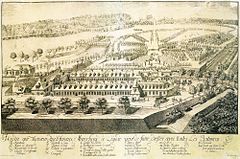Andreas Dietrich Apel

Andreas Dietrich Apel (* July 28 jul. / 7. August 1662 greg. In Quedlinburg ; † 14. January 1718 in Leipzig ) was an important Leipzig Trade Mr. and silk manufacturer.
Life
After the death of his father (1674), Apel moved from Quedlinburg to Leipzig, where he received an apprenticeship in the office of the wealthy silk merchant Jonas Barniske († 1700), a cousin of his father's. At a young age he went on study trips to Holland, Poland, France and Switzerland, became a partner in the silk merchant Barniske in 1690 and on September 1, 1691 he married his only daughter Dorothea Elisabeth († March 16, 1727).
In 1700, the aspiring businessman inherited the Bieringischer Garten in front of the Thomas Gate from his father-in-law, which had existed since 1629 and expanded the Apel with the purchase of the Schlosswiese opposite the Pleißenburg in 1701 . August the Strong - who often stayed with Apel on his visits to Leipzig and was very impressed by his wife - gave the latter another piece of property, so that the Apel couple owned a contiguous area in what is now the Inner Westvorstadt , which is to the north and east of Pleißemühl - or Diebesgraben , bordered in the south and west by the Alte Pleiße.
Andreas Dietrich Apel had the old buildings on this site demolished and instead built new factories and workshops for the production of gold and silver webs as well as velvet , silk , damask and atlas fabrics. In addition, the enterprising merchant marketed calico and printed wallpaper canvases for the first time in Saxony . Apple's business flourished so successfully that he was soon able to start implementing a long-cherished dream - building a representative baroque garden. (see: Apels Garten )
Furthermore, in 1704 the manufacturer acquired the Welschische Haus am Markt, which until then had been the heir of the professor of medicine Dr. Gottfried Welsch belonged. Apel then commissioned Leipzig's master mason Johann Gregor Fuchs (1650–1715) to renovate the building , who designed it into a royal, bourgeois city palace in the Baroque style in 1705/06. (see: Apels house )
On July 23, 1706, August the Strong designated Apel's house as a royal-electoral residence. In 1712 Andreas Dietrich Apel became master of the Kramerinnung of Leipzig.
Significance and aftermath
Andreas Dietrich Apels economic and social work enabled his descendants to occupy an outstanding position in Leipzig for about 150 years. These include the lawyer and mayor Heinrich Friedrich Innocentius Apel (1732-1802), the lawyer and writer August Apel (1771-1816) and the writer and founder Theodor Apel (1811-1867), to whom the trade fair city 44 Apelsteine to commemorate the Battle of Nations of 1813. Another descendant was Julius Freiherr von Apel (1805-1881), who embarked on a military career and made it to lieutenant general in the Saxon army.
The Apelstraße, which connects the Berlin with the Wittenberger and Dessauer Straße in the north of Leipzig, also reminds of the important family. "Apels Haus" is one of the city's sights today, "Apels Garten" has not been forgotten and Hall II of the Wittenberger Strasse tram station was named "Apelhalle" for many years .
literature
- Andreas Stephainski (editor), time travel - 1200 years of life in Leipzig , Leipziger Verlags- und Druckereigesellschaft mbH & Co. KG, Leipzig 2007, ISBN 978-3-9806625-4-3
- Karl Czok , At the court of August the Strong , Edition Leipzig, 1989, ISBN 3-361-00268-0
- Wolfgang Hocquél (editor), Leipzig , VEB EA Seemann Verlag Leipzig, 1983
- Walter Fellmann, Sachsen-Lexikon , Koehler & Amelang Verlagsgesellschaft mbH Munich Berlin, 2000, ISBN 3-7338-0234-9
Web links
Remarks
- ↑ "Accordingly, we have a proper contract with Andreas Dietrich Apeln, a tradesman in Leipzig because of his house there and located on the Marckt, so that we would like to have the intended house constantly in the three Leipzig fairs, close and us the rooms named in the enclosed specification and other conveniences, and to have their money paid for an annual interest of two thousand thalers from our pension cammer, all well managed and determined ” . This contract was only canceled in 1828 with the subsequent homeowners. - from: Karl Czok, Am Hofe Augusts des Starken , Edition Leipzig, 1989, p. 138
- ↑ Julius Freiherr von Apel in the Dresden City Wiki
| personal data | |
|---|---|
| SURNAME | Apel, Andreas Dietrich |
| BRIEF DESCRIPTION | German merchant and councilor |
| DATE OF BIRTH | August 7, 1662 |
| PLACE OF BIRTH | Quedlinburg |
| DATE OF DEATH | January 14, 1718 |
| Place of death | Leipzig |
